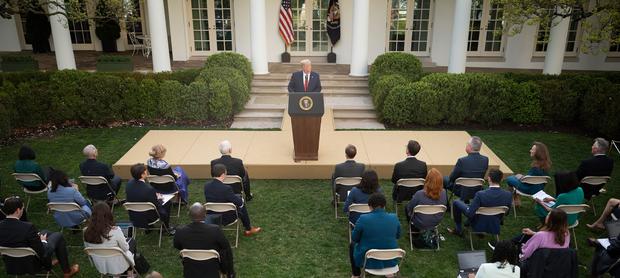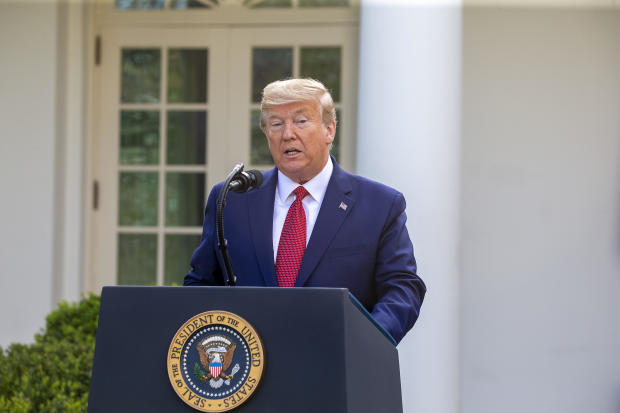Trump announces social distancing guidelines extended to April 30
President Trump said Sunday the peak in the death rate from the coronavirus pandemic is likely to hit in two weeks and extended guidelines to slow the spread of the deadly illness for 30 days.
"The better you do, the faster this whole nightmare will end," Mr. Trump said during a briefing of the White House Coronavirus Task Force from the White House Rose Garden. "Therefore, we will be extending our guidelines to April 30 to slow the spread."
The president said his administration would be finalizing social distancing guidelines on Tuesday. He said he does not anticipate the restrictions will be relaxed by region.
"It's very important that everyone strongly follow the guidelines," he said, adding that he believes the country will be "well on our way to recovery" by June 1.
Mr. Trump had previously suggested he wants to reopen the U.S. economy, which has been battered by the coronavirus outbreak, by April 12. On Sunday, he said that date was "aspirational."
Dr. Anthony Fauci, the nation's top infectious disease expert and director of the National Institute of Allergy and Infectious Diseases, said the mitigation efforts currently underway are having an impact on combating the spread of coronavirus and lauded the decision to extend the social distancing guidelines.
"The decision to ... extend this mitigation process until the end of April I think was a wise and prudent decision," he said.
The Centers for Disease Control and Prevention has urged Americans to follow social distancing measures, including by working from home and limiting social gatherings to no more than 10 people. The clock on the White House's guidelines, which Americans were told to follow for 15 days, was set to expire Monday.
There are more than 135,000 confirmed cases of the coronavirus in the U.S., according to Johns Hopkins University. More than 2,400 people in the U.S. have died of the illness, including an infant in Illinois, considered to be the youngest fatality.
The U.S. now ranks above Italy and Spain for the highest number of coronavirus cases.
Dr. Deborah Birx, the White House coronavirus response coordinator, said modeling shows that between 80,000 and 160,000, with as many as 200,000 Americans, could die from the coronavirus even with mitigation.
"We're hoping the the models are not completely right, that we can do better than what the predictions are," she said.
In addition to implementing measures designed to limit the spread of the coronavirus, the Trump administration has also been working to extend testing and securing personal protective equipment for health care workers on the front lines, to be delivered to the states.
Mr. Trump said the Food and Drug Administration on Friday authorized a new test from Abbott Laboratories that will deliver coronavirus results in as soon as five minutes and said the U.S. would begin delivering 50,000 tests daily this week.
"We've been doing more testing than any other country in the world," Mr. Trump told reporters during the briefing in the Rose Garden, adding the number of tests administered is the reason the U.S. has more confirmed coronavirus cases.
"Deployment of rapid testing will vastly accelerate our ability to monitor, track and contain the viruses," Mr. Trump said. "We will defeat this virus."
The president also detailed the new treatments being administered to patients who have tested positive for the coronavirus, including hydroxychloroquine, which along with the Z-Pak is being administered to 1,100 people in New York. The FDA is also allowing seriously ill patients to receive an experimental convalescent plasma treatment, which involves taking blood from recovered patients and transfusing it to those who are sick.
Mr. Trump seemed to question the uptick in demand for personal protective equipment such as N95 masks, asking if they are "going out the back door?"
States have also warned of a shortage of ventilators for those suffering from the coronavirus, though the president suggested hospital chains were "hoarding" ventilators.
"Many of the states are stocked up," he said. "Some of them don't admit it. We have sent just so much, so many things to them, including ventilators."
The federal government, however, is keeping 10,000 ventilators in the Strategic National Stockpile "to hold in case of emergency," Mr. Trump said.
In addition to federal guidelines, states have also been imposing their own restrictions on residents as they rush to stop the spread of the coronavirus, including by ordering nonessential businesses to close and residents to stay in their homes.
On Saturday, Mr. Trump said he was considering a quarantine on the New York metropolitan area, which is currently the epicenter of the outbreak in the U.S., but he later abandoned the idea.
Instead, the president directed the Centers for Disease Control and Prevention to issue a "travel advisory."
The advisory urges residents of New York, New Jersey and Connecticut to refrain from non-essential domestic travel for 14 days effective immediately. It does not apply to residents working in "critical infrastructure industries" such as trucking, public health, financial services and food supply.
Mr. Trump told reporters public health experts suggested a quarantine of the New York area, but he believed it was "too much to do" and difficult to enforce.
To alleviate the economic impacts of the coronavirus outbreak, the president has signed into law three legislative packages, including a $2 trillion economic stimulus package passed by Congress last week. The legislation provides direct payments to American workers, as well as loans to small businesses and large industries hurting because of the coronavirus.
Mr. Trump did not rule out a fourth relief bill, telling reporters he is "prepared to do whatever it takes to save lives and to bring back our economy."
The president also said he would take another coronavirus test "if it's appropriate," and said he hasn't experienced any symptoms associated with the illness.





